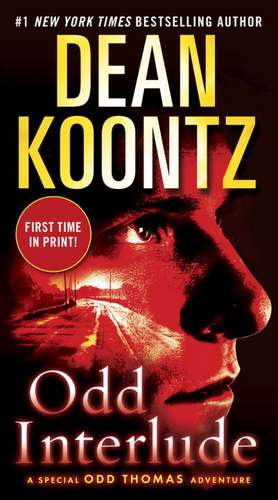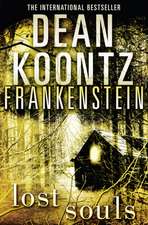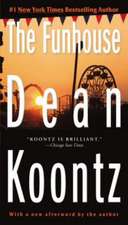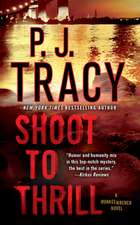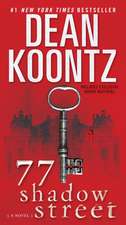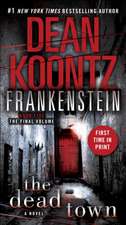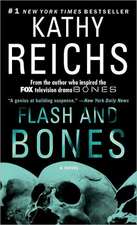Odd Interlude
Autor Dean R. Koontzen Limba Engleză Paperback – 30 noi 2012
THERE’S ROOM AT THE INN. BUT YOU MIGHT NOT GET OUT.
Nestled on a lonely stretch along the Pacific coast, quaint roadside outpost Harmony Corner offers everything a weary traveler needs—a cozy diner, a handy service station, a cluster of cottages . . . and the Harmony family homestead presiding over it all. But when Odd Thomas and company stop to spend the night, they discover that there’s more to this secluded haven than meets the eye—and that between life and death, there is something more frightening than either.
Includes a preview of the next novel in the Odd Thomas series: Deeply Odd!
“[Odd Thomas is] one of the most remarkable and appealing characters in current fiction.”—The Virginian-Pilot
“An inventive . . . mix of suspense, whimsy and uplift.”—The Washington Post
“Odd Thomas is the greatest character Dean Koontz has ever created. He’s funny, humble, immensely likable, courageous, and just a joy to read about.”—Seattle Post-Intelligencer
“Koontz gives [Odd Thomas] wit, good humor, a familiarity with the dark side of humanity—and moral outrage.”—USA Today
| Toate formatele și edițiile | Preț | Express |
|---|---|---|
| Paperback (2) | 50.87 lei 3-5 săpt. | |
| Bantam – 30 noi 2012 | 50.87 lei 3-5 săpt. | |
| HarperCollins Publishers – 26 dec 2012 | 69.44 lei 3-5 săpt. | +8.44 lei 6-12 zile |
Preț: 50.87 lei
Nou
Puncte Express: 76
Preț estimativ în valută:
9.73€ • 10.18$ • 8.09£
9.73€ • 10.18$ • 8.09£
Carte disponibilă
Livrare economică 13-27 martie
Preluare comenzi: 021 569.72.76
Specificații
ISBN-13: 9780345536594
ISBN-10: 0345536592
Pagini: 279
Dimensiuni: 114 x 187 x 19 mm
Greutate: 0.18 kg
Editura: Bantam
Colecția Bantam Books
ISBN-10: 0345536592
Pagini: 279
Dimensiuni: 114 x 187 x 19 mm
Greutate: 0.18 kg
Editura: Bantam
Colecția Bantam Books
Recenzii
“[Odd Thomas is] one of the most remarkable and appealing characters in current fiction.”—The Virginian-Pilot
“An inventive . . . mix of suspense, whimsy and uplift.”—The Washington Post
“Odd Thomas is the greatest character Dean Koontz has ever created. He’s funny, humble, immensely likable, courageous, and just a joy to read about.”—Seattle Post-Intelligencer
“Koontz gives [Odd Thomas] wit, good humor, a familiarity with the dark side of humanity—and moral outrage.”—USA Today
“An inventive . . . mix of suspense, whimsy and uplift.”—The Washington Post
“Odd Thomas is the greatest character Dean Koontz has ever created. He’s funny, humble, immensely likable, courageous, and just a joy to read about.”—Seattle Post-Intelligencer
“Koontz gives [Odd Thomas] wit, good humor, a familiarity with the dark side of humanity—and moral outrage.”—USA Today
Notă biografică
Dean Koontz, the author of many #1 New York Times bestsellers, lives in Southern California with his wife, Gerda, their golden retriever, Anna, and the enduring spirit of their golden, Trixie.
Extras
PART ONE
SOUTH OF MOONLIGHT BAY
Oh! They’re too beautiful to live, much too beautiful.
—Charles Dickens, Nicholas Nickleby
One
They say that every road leads home if you care to go there. I long for home, for the town of Pico Mundo and the desert in which it blooms, but the roads that I take seem to lead me to one hell after another.
In the front passenger seat of the Mercedes, through the side window, I watch the stars, which appear to be fixed but in fact are ever moving and perpetually receding. They seem eternal, but they are only suns that will burn out one day.
When she was just a child, Stormy Llewellyn lost her mother, Cassiopeia. I lost Stormy when she and I were twenty. One of the northern constellations is called Cassiopeia. No group of distant suns is named for Stormy.
I can see Cassiopeia’s namesake high in the night, but I can see Stormy only in my memory, where she remains as vivid as any living person I might meet.
The stars and everything else in the universe began with the big bang, which was when time also began. Some place existed before the universe, exists outside of it now, and will exist when the universe collapses back upon itself. In that mysterious place, outside of time, Stormy waits for me. Only through time can time be conquered, and the way forward is the only way back to my girl.
Yet again, because of recent events, I have been called a hero, and again I don’t feel like one.
Annamaria insists that mere hours earlier, I saved entire cities, sparing many hundreds of thousands from nuclear terrorism. Even if that is most likely true, I feel as though, in the process, I have forfeited a piece of my soul.
To foil the conspiracy, I killed four men and one young woman. They would have killed me if given a chance, but the honest claim of self-defense doesn’t make the killing lie less heavily upon my heart.
I wasn’t born to kill. Like all of us, I was born for joy. This broken world, however, breaks most of us, grinding relentlessly on its metaled tracks.
Leaving Magic Beach, fearing pursuit, I had driven the Mercedes that my friend Hutch Hutchison lent me. After several miles, when the memories of recent violence overwhelmed me, I stopped along the side of the road and changed places with Annamaria.
Now, behind the wheel, by way of consolation, she says, “Life is hard, young man, but it was not always so.”
I have known her less than twenty-four hours. And the longer I know her, the more she mystifies me. She is perhaps eighteen, almost four years younger than me, but she seems much older. The things she says are often cryptic, though I feel that the meaning would be clear to me if I were wiser than I am.
Plain but not unattractive, petite, with flawless pale skin and great dark eyes, she seems to be about seven months pregnant. Any girl her age, in her condition, alone in the world as she is, ought to be anxious, but she is calm and confident, as if she believes that she lives a charmed life—which often seems to be the case.
We are not linked romantically. After Stormy, there can be none of that for me. Although we do not speak of it, between us there is a kind of love, platonic but deep, strangely deep considering that we have known each other such a short while. I have no sister, although perhaps this is how I would feel if I were Annamaria’s brother.
Magic Beach to Santa Barbara, our destination, is a four-hour drive, a straight shot down the coast. We have been on the road less than two hours when, two miles past the picturesque town of Moonlight Bay and Fort Wyvern—an army base that has been closed since the end of the Cold War—she says, “Do you feel it pulling at you, odd one?”
My name is Odd Thomas, which I explained in previous volumes of this memoir, which I will no doubt explain again in future volumes, but which I will not explain here, in this detour from the main arc of my journey. Until Annamaria, only Stormy called me “odd one.”
I am a short-order cook, though I haven’t worked in a diner since I left Pico Mundo eighteen months earlier. I miss the griddle, the deep fryer. A job like that is centering. Griddle work is Zen.
“Do you feel it pulling?” she repeats. “Like the gravity of the moon pulling tides through the sea.”
Curled on the backseat, the golden retriever, Raphael, growls as if in answer to Annamaria’s question. Our other dog, the white German shepherd named Boo, of course makes no sound.
Slumped in my seat, head resting against the cool glass of the window in the passenger door, half hypnotized by the patterns in the stars, I feel nothing unusual until Annamaria asks her question. But then I sense unmistakably that something in the night summons me, not to Santa Barbara but elsewhere.
I have a sixth sense with several facets, the first of which is that I can see the spirits of the lingering dead, who are reluctant to move on to the Other Side. They often want me to bring justice to their murderers or to help them find the courage to cross from this world to the next. Once in a while, I have a prophetic dream. And since leaving Pico Mundo after Stormy’s violent death, I seem to be magnetized and drawn toward places of trouble, to which some Power wishes me to travel.
My life has mysterious purpose that I don’t understand, and day by day, conflict by conflict, I learn by going where I have to go.
Now, to the west, the sea is black and forbidding except for a distorted reflection of the icy moon, which on those waters melts into a long silvery smear.
In the headlights, the broken white line on the blacktop flashes toward the south.
“Do you feel it pulling?” she asks again.
The inland hills are dark, but ahead on the right, pools of warm light welcome travelers at a cluster of enterprises that are not associated with a town.
“There,” I say. “Those lights.”
As soon as I speak, I know we will find death in this place. But there is no turning back. I am compelled to act in these cases. Besides, this woman seems to have become my backup conscience, gently reminding me what is the right thing to do when I falter.
A hundred yards past a sign that promises food fuel lodging, an exit from the highway looms. She takes it fast, but with confidence and skill.
As we reach the foot of the ramp and halt at a stop sign, I say, “You feel it, too?”
“I’m not gifted as you are, odd one. I don’t feel such things. But I know.”
“What do you know?”
“What I need to know.”
“Which is?”
“Which is what is.”
“And what is this what-is that you know?”
She smiles. “I know what matters, how it all works, and why.”
The smile suggests she enjoys tweaking me by being enigmatic—although there is no meanness in her teasing.
I don’t believe there is any deception in her, either. I am convinced she always speaks the truth. And she does not, as it might seem, talk in code. She speaks the truth profoundly but perhaps as poets speak it: obliquely, employing paradox, symbols, metaphors.
I met her on a public pier in Magic Beach. I know nothing of substance about her past. I don’t even know her last name; she claims that she doesn’t have one. When I first saw Annamaria, I sensed that she harbored extraordinary secrets and that she needed a friend. She has accepted my friendship and has given hers to me. But she holds tightly to her secrets.
The stop sign is at an intersection with a two-lane county road that parallels the state highway. She turns left and drives toward a service station that is open even in these lonely hours before dawn, offering a discount brand of gasoline and a mechanic on call.
Instead of a double score of gasoline pumps that a truck stop might offer, this station provides just four pumps on two islands. At the moment, none is in use.
Dating from the 1930s, the flat-roofed white-stucco building features Art Deco details, including a cast-plaster frieze revealed by lights in the overhanging cornice. The frieze depicts stylized cars and borzoi hounds racing perpetually, painted in yellows, grays, and royal blue.
The place is quaint, a little architectural gem from an age when even humble structures were often artfully designed and embellished. It is impeccably maintained, and the warm light in the panes of the French windows no doubt looks welcoming to an average traveler, although nothing here charms me.
Intuition sometimes whispers to me but is seldom loud. Now it is equivalent to a shout, warning me that although this place might be pleasing to the eye, under the attractive surface lies something terrible.
In the backseat, Raphael growls low again.
I say, “I don’t like this place.”
Annamaria is unperturbed. “If you liked it, young man, there’d be no reason for us to be here.”
A tow truck stands beside the station. One of the two bay doors is raised, and even at this hour, a mechanic works on a Jaguar.
A nattily dressed man with a mane of silver hair—perhaps the owner of the Jaguar, recently rescued from the side of the highway—stands watching the mechanic and sipping coffee from a paper cup. Neither of them looks up as we cruise past.
Three eighteen-wheelers—a Mack, a Cascadia, and a Peterbilt—are parked on the farther side of the station. These well-polished rigs appear to belong to owner-operators, because they have custom paint jobs, numerous chrome add-ons, double-hump fenders, and the like.
Beyond the trucks, a long low building appears to be a diner, in a style matching the service sta- tion. The eatery announces itself with rooftop red- and-blue neon: HARMONY CORNER / open 24 hours. Two pickups and two SUVs are in front of the diner, and when Annamaria parks there, the Mercedes’ headlights brighten a sign informing us that for cottage rentals we should inquire within.
The third and final element of this enterprise, ten cottages, lies past the restaurant. The units are arranged in an arc, sheltered under mature New Zealand Christmas trees and graceful acacias softly but magically lighted. It appears to be a motor court from the early days of automobile travel, a place where Humphrey Bogart might hide out with Lauren Bacall and eventually end up in a gunfight with Edward G. Robinson.
“They’ll have two cottages available,” Annamaria predicts as she switches off the engine. When I start to open my door, she says, “No. Wait here. We’re not far from Magic Beach. There may be an all-points bulletin out for you.”
After thwarting delivery of the four thermo- nuclear devices to terrorists, mere hours earlier, I’d called the FBI office in Santa Cruz to report that they could find four bomb triggers among the used clothing in a Salvation Army collection bin in Magic Beach. They know I’m not one of the conspirators, but they are eager to talk with me anyway. As far as the FBI is concerned, this is prom night, and they don’t want me leaving the dance with anyone but them.
“They don’t know my name,” I assure Annamaria. “And they don’t have my picture.”
“They might have a good description. Before you show yourself around here, Oddie, let’s see how big a story it is on the news.”
I extract my wallet from a hip pocket. “I’ve got some cash.”
“So do I.” She waves away the wallet. “Enough for this.”
As I slump in the dark car, she goes into the diner.
She is wearing athletic shoes, gray slacks, and a baggy sweater that doesn’t conceal her pregnancy. The sleeves are too long, hanging past the first knuckles of her fingers. She looks like a waif.
People warm to her on sight, and the trust that she inspires in everyone is uncanny. They aren’t likely to turn her away just because she lacks a credit card and ID.
In Magic Beach, she had been living rent-free in an apartment above a garage. She says that although she never asks for anything, people give her what she needs. I have seen that this is true.
She claims there are people who want to kill her, but she seems to have no fear of them, whoever they might be. I have yet to see proof that she fears anything.
Earlier, she asked if I would die for her. Without hesitation, I said that I would—and meant it.
I don’t understand either my reaction to her or the source of her power. She is something other than she appears to be. She tells me that I already know what she is and that I only need to accept the knowledge that I already possess.
Weird. Or maybe not.
Long ago, I learned that, even with my sixth sense, I am not a singularity and that the world is a place of layered wonders beyond counting. Most people unconsciously blind themselves to the true nature of existence, because they fear knowing that this world is a place of mystery and meaning. It’s immeasurably easier to live in a world that’s all surfaces, that means nothing and demands nothing of you.
Because I so love this wondrous world, I am by nature optimistic and of good humor. My friend and mentor Ozzie Boone says buoyancy is one of my better qualities. However, as though to warn that excess buoyancy might lead to carelessness, he sometimes reminds me that shit, too, floats.
But on my worst days, which are rare and of which this is one, I can get down so low that the bottom seems to be where I belong. I don’t even want to look for a way up. I suppose surrender to sadness is a sin, though my current sadness is not a black depression but is instead a sorrow like a long moody twilight.
When Annamaria returns and gets behind the wheel, she hands me one of two keys. “It’s a nice place. Sparkling clean. And the food smells good. It’s called Harmony Corner because it’s all owned and operated by the Harmony family, quite a big clan judging by what Holly Harmony told me. She’s the lone waitress this shift.”
Annamaria starts the Mercedes and drives to the motor court, repeatedly glancing at me, which I pretend not to notice.
After she parks between two cottages and switches off the engine and the headlights, she says, “Melancholy can be seductive when it’s twined with self-pity.”
“I don’t pity myself,” I assure her.
“Then what would you call it? Perhaps self-sympathy?”
I decide not to answer.
“Self-compassion?” she suggests. “Self-commiseration? Self-condolence?”
“I didn’t think it was in your nature to needle a guy.”
“Oh, young man, I’m not needling you.”
“Then what would you call it?”
“Compassionate mockery.”
SOUTH OF MOONLIGHT BAY
Oh! They’re too beautiful to live, much too beautiful.
—Charles Dickens, Nicholas Nickleby
One
They say that every road leads home if you care to go there. I long for home, for the town of Pico Mundo and the desert in which it blooms, but the roads that I take seem to lead me to one hell after another.
In the front passenger seat of the Mercedes, through the side window, I watch the stars, which appear to be fixed but in fact are ever moving and perpetually receding. They seem eternal, but they are only suns that will burn out one day.
When she was just a child, Stormy Llewellyn lost her mother, Cassiopeia. I lost Stormy when she and I were twenty. One of the northern constellations is called Cassiopeia. No group of distant suns is named for Stormy.
I can see Cassiopeia’s namesake high in the night, but I can see Stormy only in my memory, where she remains as vivid as any living person I might meet.
The stars and everything else in the universe began with the big bang, which was when time also began. Some place existed before the universe, exists outside of it now, and will exist when the universe collapses back upon itself. In that mysterious place, outside of time, Stormy waits for me. Only through time can time be conquered, and the way forward is the only way back to my girl.
Yet again, because of recent events, I have been called a hero, and again I don’t feel like one.
Annamaria insists that mere hours earlier, I saved entire cities, sparing many hundreds of thousands from nuclear terrorism. Even if that is most likely true, I feel as though, in the process, I have forfeited a piece of my soul.
To foil the conspiracy, I killed four men and one young woman. They would have killed me if given a chance, but the honest claim of self-defense doesn’t make the killing lie less heavily upon my heart.
I wasn’t born to kill. Like all of us, I was born for joy. This broken world, however, breaks most of us, grinding relentlessly on its metaled tracks.
Leaving Magic Beach, fearing pursuit, I had driven the Mercedes that my friend Hutch Hutchison lent me. After several miles, when the memories of recent violence overwhelmed me, I stopped along the side of the road and changed places with Annamaria.
Now, behind the wheel, by way of consolation, she says, “Life is hard, young man, but it was not always so.”
I have known her less than twenty-four hours. And the longer I know her, the more she mystifies me. She is perhaps eighteen, almost four years younger than me, but she seems much older. The things she says are often cryptic, though I feel that the meaning would be clear to me if I were wiser than I am.
Plain but not unattractive, petite, with flawless pale skin and great dark eyes, she seems to be about seven months pregnant. Any girl her age, in her condition, alone in the world as she is, ought to be anxious, but she is calm and confident, as if she believes that she lives a charmed life—which often seems to be the case.
We are not linked romantically. After Stormy, there can be none of that for me. Although we do not speak of it, between us there is a kind of love, platonic but deep, strangely deep considering that we have known each other such a short while. I have no sister, although perhaps this is how I would feel if I were Annamaria’s brother.
Magic Beach to Santa Barbara, our destination, is a four-hour drive, a straight shot down the coast. We have been on the road less than two hours when, two miles past the picturesque town of Moonlight Bay and Fort Wyvern—an army base that has been closed since the end of the Cold War—she says, “Do you feel it pulling at you, odd one?”
My name is Odd Thomas, which I explained in previous volumes of this memoir, which I will no doubt explain again in future volumes, but which I will not explain here, in this detour from the main arc of my journey. Until Annamaria, only Stormy called me “odd one.”
I am a short-order cook, though I haven’t worked in a diner since I left Pico Mundo eighteen months earlier. I miss the griddle, the deep fryer. A job like that is centering. Griddle work is Zen.
“Do you feel it pulling?” she repeats. “Like the gravity of the moon pulling tides through the sea.”
Curled on the backseat, the golden retriever, Raphael, growls as if in answer to Annamaria’s question. Our other dog, the white German shepherd named Boo, of course makes no sound.
Slumped in my seat, head resting against the cool glass of the window in the passenger door, half hypnotized by the patterns in the stars, I feel nothing unusual until Annamaria asks her question. But then I sense unmistakably that something in the night summons me, not to Santa Barbara but elsewhere.
I have a sixth sense with several facets, the first of which is that I can see the spirits of the lingering dead, who are reluctant to move on to the Other Side. They often want me to bring justice to their murderers or to help them find the courage to cross from this world to the next. Once in a while, I have a prophetic dream. And since leaving Pico Mundo after Stormy’s violent death, I seem to be magnetized and drawn toward places of trouble, to which some Power wishes me to travel.
My life has mysterious purpose that I don’t understand, and day by day, conflict by conflict, I learn by going where I have to go.
Now, to the west, the sea is black and forbidding except for a distorted reflection of the icy moon, which on those waters melts into a long silvery smear.
In the headlights, the broken white line on the blacktop flashes toward the south.
“Do you feel it pulling?” she asks again.
The inland hills are dark, but ahead on the right, pools of warm light welcome travelers at a cluster of enterprises that are not associated with a town.
“There,” I say. “Those lights.”
As soon as I speak, I know we will find death in this place. But there is no turning back. I am compelled to act in these cases. Besides, this woman seems to have become my backup conscience, gently reminding me what is the right thing to do when I falter.
A hundred yards past a sign that promises food fuel lodging, an exit from the highway looms. She takes it fast, but with confidence and skill.
As we reach the foot of the ramp and halt at a stop sign, I say, “You feel it, too?”
“I’m not gifted as you are, odd one. I don’t feel such things. But I know.”
“What do you know?”
“What I need to know.”
“Which is?”
“Which is what is.”
“And what is this what-is that you know?”
She smiles. “I know what matters, how it all works, and why.”
The smile suggests she enjoys tweaking me by being enigmatic—although there is no meanness in her teasing.
I don’t believe there is any deception in her, either. I am convinced she always speaks the truth. And she does not, as it might seem, talk in code. She speaks the truth profoundly but perhaps as poets speak it: obliquely, employing paradox, symbols, metaphors.
I met her on a public pier in Magic Beach. I know nothing of substance about her past. I don’t even know her last name; she claims that she doesn’t have one. When I first saw Annamaria, I sensed that she harbored extraordinary secrets and that she needed a friend. She has accepted my friendship and has given hers to me. But she holds tightly to her secrets.
The stop sign is at an intersection with a two-lane county road that parallels the state highway. She turns left and drives toward a service station that is open even in these lonely hours before dawn, offering a discount brand of gasoline and a mechanic on call.
Instead of a double score of gasoline pumps that a truck stop might offer, this station provides just four pumps on two islands. At the moment, none is in use.
Dating from the 1930s, the flat-roofed white-stucco building features Art Deco details, including a cast-plaster frieze revealed by lights in the overhanging cornice. The frieze depicts stylized cars and borzoi hounds racing perpetually, painted in yellows, grays, and royal blue.
The place is quaint, a little architectural gem from an age when even humble structures were often artfully designed and embellished. It is impeccably maintained, and the warm light in the panes of the French windows no doubt looks welcoming to an average traveler, although nothing here charms me.
Intuition sometimes whispers to me but is seldom loud. Now it is equivalent to a shout, warning me that although this place might be pleasing to the eye, under the attractive surface lies something terrible.
In the backseat, Raphael growls low again.
I say, “I don’t like this place.”
Annamaria is unperturbed. “If you liked it, young man, there’d be no reason for us to be here.”
A tow truck stands beside the station. One of the two bay doors is raised, and even at this hour, a mechanic works on a Jaguar.
A nattily dressed man with a mane of silver hair—perhaps the owner of the Jaguar, recently rescued from the side of the highway—stands watching the mechanic and sipping coffee from a paper cup. Neither of them looks up as we cruise past.
Three eighteen-wheelers—a Mack, a Cascadia, and a Peterbilt—are parked on the farther side of the station. These well-polished rigs appear to belong to owner-operators, because they have custom paint jobs, numerous chrome add-ons, double-hump fenders, and the like.
Beyond the trucks, a long low building appears to be a diner, in a style matching the service sta- tion. The eatery announces itself with rooftop red- and-blue neon: HARMONY CORNER / open 24 hours. Two pickups and two SUVs are in front of the diner, and when Annamaria parks there, the Mercedes’ headlights brighten a sign informing us that for cottage rentals we should inquire within.
The third and final element of this enterprise, ten cottages, lies past the restaurant. The units are arranged in an arc, sheltered under mature New Zealand Christmas trees and graceful acacias softly but magically lighted. It appears to be a motor court from the early days of automobile travel, a place where Humphrey Bogart might hide out with Lauren Bacall and eventually end up in a gunfight with Edward G. Robinson.
“They’ll have two cottages available,” Annamaria predicts as she switches off the engine. When I start to open my door, she says, “No. Wait here. We’re not far from Magic Beach. There may be an all-points bulletin out for you.”
After thwarting delivery of the four thermo- nuclear devices to terrorists, mere hours earlier, I’d called the FBI office in Santa Cruz to report that they could find four bomb triggers among the used clothing in a Salvation Army collection bin in Magic Beach. They know I’m not one of the conspirators, but they are eager to talk with me anyway. As far as the FBI is concerned, this is prom night, and they don’t want me leaving the dance with anyone but them.
“They don’t know my name,” I assure Annamaria. “And they don’t have my picture.”
“They might have a good description. Before you show yourself around here, Oddie, let’s see how big a story it is on the news.”
I extract my wallet from a hip pocket. “I’ve got some cash.”
“So do I.” She waves away the wallet. “Enough for this.”
As I slump in the dark car, she goes into the diner.
She is wearing athletic shoes, gray slacks, and a baggy sweater that doesn’t conceal her pregnancy. The sleeves are too long, hanging past the first knuckles of her fingers. She looks like a waif.
People warm to her on sight, and the trust that she inspires in everyone is uncanny. They aren’t likely to turn her away just because she lacks a credit card and ID.
In Magic Beach, she had been living rent-free in an apartment above a garage. She says that although she never asks for anything, people give her what she needs. I have seen that this is true.
She claims there are people who want to kill her, but she seems to have no fear of them, whoever they might be. I have yet to see proof that she fears anything.
Earlier, she asked if I would die for her. Without hesitation, I said that I would—and meant it.
I don’t understand either my reaction to her or the source of her power. She is something other than she appears to be. She tells me that I already know what she is and that I only need to accept the knowledge that I already possess.
Weird. Or maybe not.
Long ago, I learned that, even with my sixth sense, I am not a singularity and that the world is a place of layered wonders beyond counting. Most people unconsciously blind themselves to the true nature of existence, because they fear knowing that this world is a place of mystery and meaning. It’s immeasurably easier to live in a world that’s all surfaces, that means nothing and demands nothing of you.
Because I so love this wondrous world, I am by nature optimistic and of good humor. My friend and mentor Ozzie Boone says buoyancy is one of my better qualities. However, as though to warn that excess buoyancy might lead to carelessness, he sometimes reminds me that shit, too, floats.
But on my worst days, which are rare and of which this is one, I can get down so low that the bottom seems to be where I belong. I don’t even want to look for a way up. I suppose surrender to sadness is a sin, though my current sadness is not a black depression but is instead a sorrow like a long moody twilight.
When Annamaria returns and gets behind the wheel, she hands me one of two keys. “It’s a nice place. Sparkling clean. And the food smells good. It’s called Harmony Corner because it’s all owned and operated by the Harmony family, quite a big clan judging by what Holly Harmony told me. She’s the lone waitress this shift.”
Annamaria starts the Mercedes and drives to the motor court, repeatedly glancing at me, which I pretend not to notice.
After she parks between two cottages and switches off the engine and the headlights, she says, “Melancholy can be seductive when it’s twined with self-pity.”
“I don’t pity myself,” I assure her.
“Then what would you call it? Perhaps self-sympathy?”
I decide not to answer.
“Self-compassion?” she suggests. “Self-commiseration? Self-condolence?”
“I didn’t think it was in your nature to needle a guy.”
“Oh, young man, I’m not needling you.”
“Then what would you call it?”
“Compassionate mockery.”
Descriere
Koontz's "New York Times"-bestselling three-part digital series is now available in one volume, in print for the very first time. A unique, stand-alone Odd Thomas adventure, "Odd Interlude" occurs between the events of "Odd Hours" and "Odd Apocalypse." Original.
